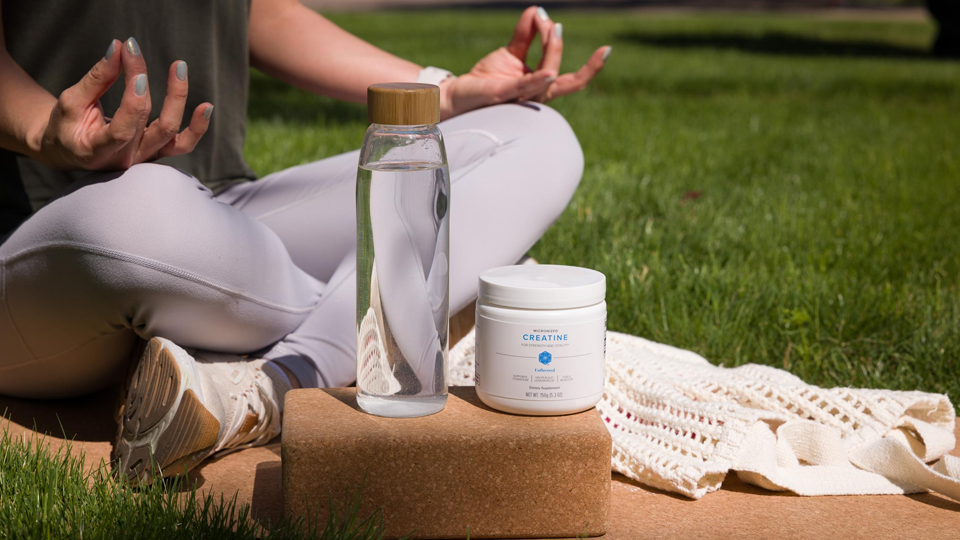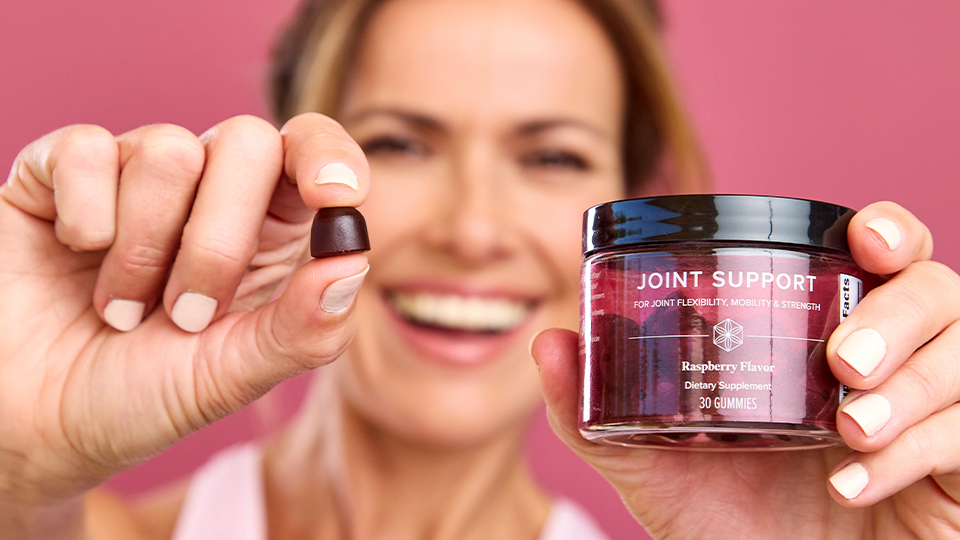It’s a common myth that creatine is strictly for bodybuilders. In fact, creatine has benefits for every athlete, including women. Because of the beefed-up stereotypes surrounding creatine, women often miss out on benefits of enhanced training and improved recovery (1, 2). It’s possible that creatine may have extra benefits for women, especially for those who have avoided creatine supplements in the past.
What is creatine?
Creatine is a naturally occurring compound found in the body and is used as a source of energy for every cell. While the body has a limited ability to make its own creatine from amino acids, dietary sources of creatine contribute significantly to meeting the body’s needs. Meat and fish are the main food sources that can supply small amounts of creatine. However, factors like freshness and cooking reduce the amount of creatine available in foods (3). Consuming creatine as a supplement will increase the amount of creatine available to muscles and can provide an edge during workouts (4). The added energy from creatine increases resistance to muscular fatigue, allowing you to train harder and see results more quickly (5, 6). There is also evidence that creatine can reduce exercise-induced lactic acid buildup and speed post-workout recovery (2).
Will creatine make me gain weight?
A common concern among women related to creatine supplements is that taking creatine will cause water retention and weight gain, often thought of as “bloating”. Some research published as early as the 1970s and 1980s did suggest that some people may experience a temporary increase in total body water (water retention) after using creatine supplements (7). These earlier studies used comparatively high doses of creatine, around 10 or 20 grams daily. When consumed in these high amounts, about half of the creatine supplement is excreted in the urine, suggesting that these high doses are more than the body can use at once (8). Continued research on creatine supplementation shows that much lower doses taken over time, around two or three grams daily, are effective at enhancing resistance to muscle fatigue without causing any changes in body weight or water retention (9).
See: AMPED Power: Enhancing Your Workout Without the Bloat
How can women benefit from creatine?
In terms of performance, creatine supplements offer equal benefits to both men and women. However, some research suggests that creatine supplementation might help women make greater exercise improvements. In a study published in the Journal of Sports Nutrition and Exercise Metabolism, researchers found that relative to their beginning performance, women who received creatine showed a significantly greater improvement than men.
Is creatine more effective for women than men?
Although the trials included in this study didn’t measure levels of muscle creatine directly, the researchers speculated that the reason women showed greater relative improvements than men may have been because the women started with lower levels of muscle creatine. Other research supports the idea that someone who starts with a lower level of muscle creatine could see a bigger boost to their workout when they begin using creatine than a person who has a higher initial creatine level. For example, several studies have looked at the benefits of creatine supplements for vegetarian athletes. Since creatine is found in meat and fish, vegetarians receive little if any creatine in their diets and tend to have lower levels than omnivores (10, 11). If you are the type of person who usually choses a salad over a burger, the results of these studies suggest that creatine supplements may have added benefits for you.
While there are some persistent stereotypes and myths surrounding creatine, it is one of the best-researched performance nutrition supplements available. The benefits of added muscle energy, enhanced training, and faster recovery are for every athlete, but women in particular may be short-changing themselves by avoiding creatine. Creatine supplementation can benefit anyone who exercises and may offer even greater benefits to someone who has previously avoided creatine or may have lower levels of creatine in the body.
References
- Branch JD. Effect of creatine supplementation on body composition and performance: a meta-analysis. Int J Sport Nutr Exerc Metab. 2003 Jun;13(2):198-226.
- Deminice R et al. Effects of creatine supplementation on oxidative stress and inflammatory markers after repeated-sprint exercise in humans. Nutrition 2013;29:1127-32.
- Stead LM, Au KP, Jacobs RL, Brosnan ME, Brosnan JT. 2001. Methylation demand and homocysteine metabolism: effects of dietary provision of creatine and guanidinoacetate. Am J Physiol Endocrinol Metab. 281:E1095–100
- Brosnan JT, Brosnan ME. Creatine: endogenous metabolite, dietary, and therapeutic supplement. Annu Rev Nutr. 2007;27:241-61.
- Van Loon LJ et al. Effects of creatine loading and prolonged creatine supplementation on body composition, fuel selection, sprint and endurance performance in humans. Clin Sci 2003;104:153-62.
- Aguiar AF, et al. Long-term creatine supplementation improves muscular performance during resistance training in older women. Eur J Appl Physiol 2013;113:987-96
- Poortmans JR, Francaux M. Adverse effects of creatine supplementation: fact or fiction? Sports Med 2000 Sep;30(3):155-70.
- Rawson ES, Clarkson PM, Price TB, Miles MP. Differential response of muscle phosphocreatine to creatine supplementation in young and old subjects. Acta Physiol Scand 2002;174:57–65.
- Rawson ES, Stec MJ, Frederickson SJ, Miles MP. Low-dose creatine supplementation enhances fatigue resistance in the absence of weight gain. Nutrition. 2011 Apr;27(4):451-5. doi:10.1016/j.nut.2010.04.001
- Burke DG, Chilibeck PD, Parise G, Candow DG, Mahoney D, Tarnopolsky M. 2003. Effect of creatine and weight training on muscle creatine and performance in vegetarians. Med Sci Sports Exerc. 35:1946–55.
- Delanghe J, De Slypere JP, De Buyzere M, Robbrecht J, Wieme R, Vermeulen A. 1989. Normal reference values for creatine, creatinine and carnitine are lower in vegetarians. Clin Chem. 35:1802–3





